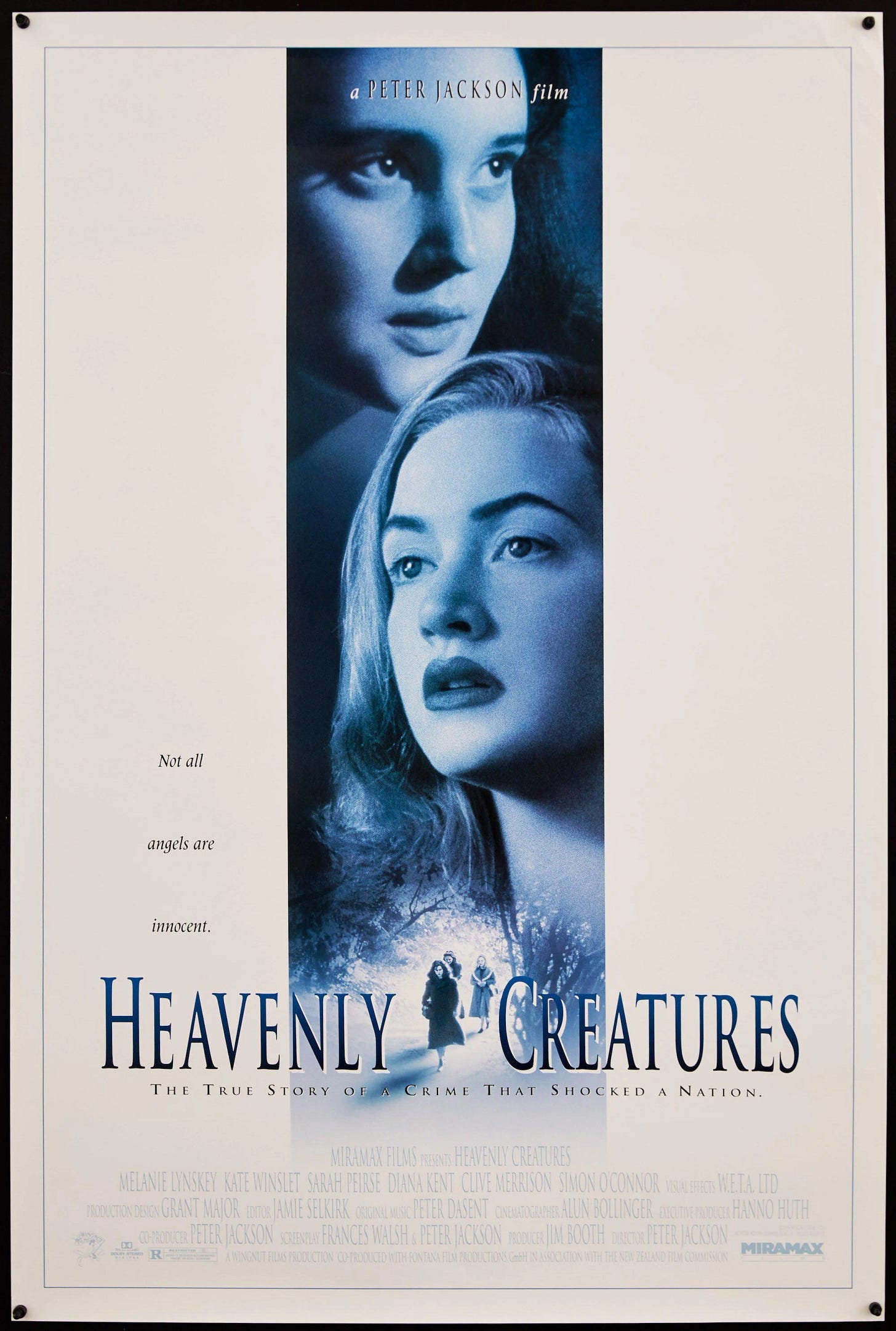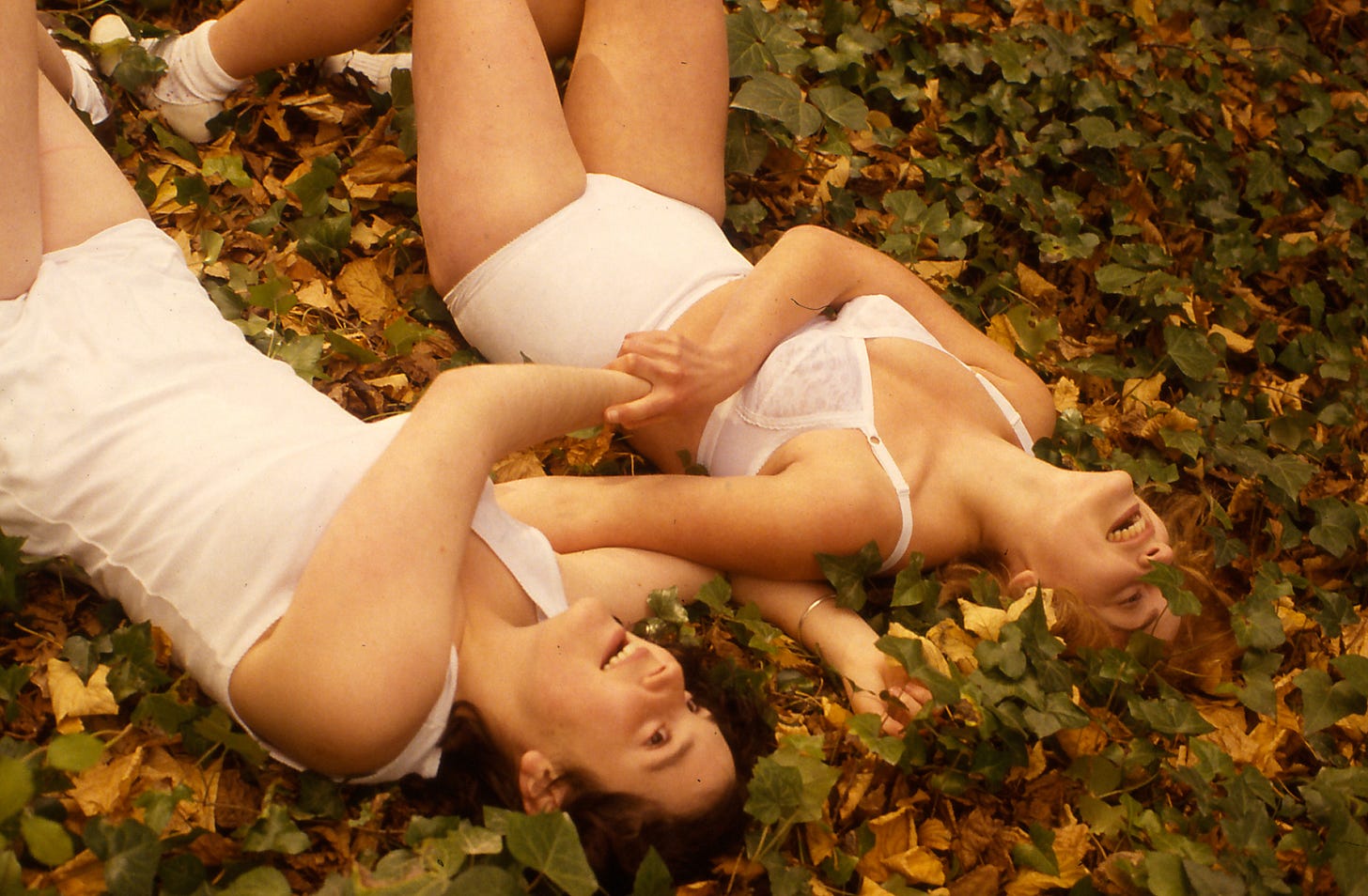Delulu Girls
On "Heavenly Creatures," the too-muchness of girlhood and bumblebees ignoring the laws of aerodynamics.
It’s that time! I’m happy you’re here and deeply grateful to you for being a paid subscriber. It means you’re directly supporting me and my work and that means the world. Alright! Monday private post here. we. go
Film-of-the-week :
Heavenly Creatures (1994) Dir. Peter Jackson
I recently watched Peter Jackson’s illusory, hallucinatory, and terribly romantic “Heavenly Creatures” as inspiration for a script I’m working on and god damn is it fucking great. The opening grips you by the throat. We smash into the world (and literally through a bush) to the sounds of blood-curdling screams. The camera careens through hedges and we run with two girls frantically lumbering through the greenery. Suddenly we cut to a sepia-toned world where the same girls, now with gleeful smiles, run on the deck of a boat towards someone they call “mummy.” The opening throws us into the experience of living in and between two worlds. We toggle between a land of chaotic screams and a world of silent joy. Is one a memory or a dream? Which world is real and which is a fantasy? Or is it a nightmare? We’re about to find out.
“Heavenly Creatures” is a film based on the 'True Story of a Crime That Shocked a Nation' that stars Melanie Lynskey and Kate Winslet in their feature film debuts. The film is an account of Honora Parker's death at the hands of her daughter and her schoolmate. This murder case was so sensational, so notorious, that the names Pauline Parker and Juliet Hulm reached mythological status in New Zealand (where the murder occurred). Jackson describes his film as “a murder story about love, a murder story with no villains”.
Acclaimed writer and activist Sydney Pokorney describes Jackson’s interpretation of Hulme and Parker’s relationship in Frieze magazine as “Star-crossed lovers who wanted only to be together.” Pokorney goes on to say:
Only the participants know this to be true or false, but to the law, to the families and to many of the psychiatrists called as expert witnesses, this was the truth. The two girls were believed to have killed for their love for one another and for their love of their world.
This “world” Pokorney describes is a fictional world the girls called “Borovnia” where all the people are made of clay (like the ones Pauline sculpts in her spare time), butterflies are the size of cars and wildflowers are forever in bloom. There are also castles, carnivalesque festivals, and orgies.
In her essay about the film written in 1995, Pokorney goes on to question how to define Pauline Parker and Juliet Hulm’s relationship:
Were they 'stark staring mad' or merely evil? Were they homosexual? Were they hysterical? At their trial, expert witnesses tried to answer these questions, offering explanations predicated on the notion that insanity and homosexuality were both 'conditions', or pathologies, that could be a motive for murder. The casual kiss, the desperate embrace and the constant companionship all gave cause for grave concern. Testimony is given that the girls slept in one another's beds, bathed together and dressed together. Yet, just as no two experts could decide if the pair were insane, no two could decide if their relationship was homosexual. The jury and magistrate stepped in and Deborah and Gina were found guilty of murder and proclaimed sane by the jury. Sentenced to an indefinite period of imprisonment, they were paroled five years later on the condition that they should never see one another again. Absolved of a brutal murder after only five years, it is clear that it was not the cold blooded killing that was their transgression, but rather their 'unnatural' and 'obsessive' relationship. By demanding this separation, the court criminalised their relationship and their bond.
I was drawn to “Heavenly Creatures” not because I wanted to watch a true crime thriller but because I wanted to study the film’s depiction of Parker and Hulm’s “obsessive” relationship. I wanted to get underneath all their unruly girlhood, the ‘too-muchness” of it, and the supercharged, feral intimacy.
I love how Pauline Parker's diary entries are sprinkled throughout the film giving voice to the girls’ thoughts about their “Borovnian” world, their shared hopes and fears, and of course their desires. The shared diary entries also reveal what the girls viewed as inalienable truths.
Pauline writes “We have decided how sad it is for other people that they cannot appreciate our genius."
I feel you, girl.
While watching “Heavenly Creatures” I relished witnessing how “excessive” the girls were. How their feelings and thoughts spill outside the bounds of what’s deemed acceptable in terms of femininity. As a girl, I always felt like I was “too much” so seeing girls like Pauline and Juliet, girls who are viewed as “deviant,” and who subvert societal expectations and gender norms feels thrilling and affirming. I love seeing gutsy girls who are strange, messy, and “unlikeable.” I love watching “difficult” girls. Persistent girls. Active girls. Girls who aren’t trying to be fuckable. In this film, they also just happen to commit a murder.
Trailer:
Watch Now: It looks like it’s not avail to rent in the US via Amazon anymore BUT I found this link to watch.
Keep reading with a 7-day free trial
Subscribe to GIVE ME MORE by Jessie Barr to keep reading this post and get 7 days of free access to the full post archives.









